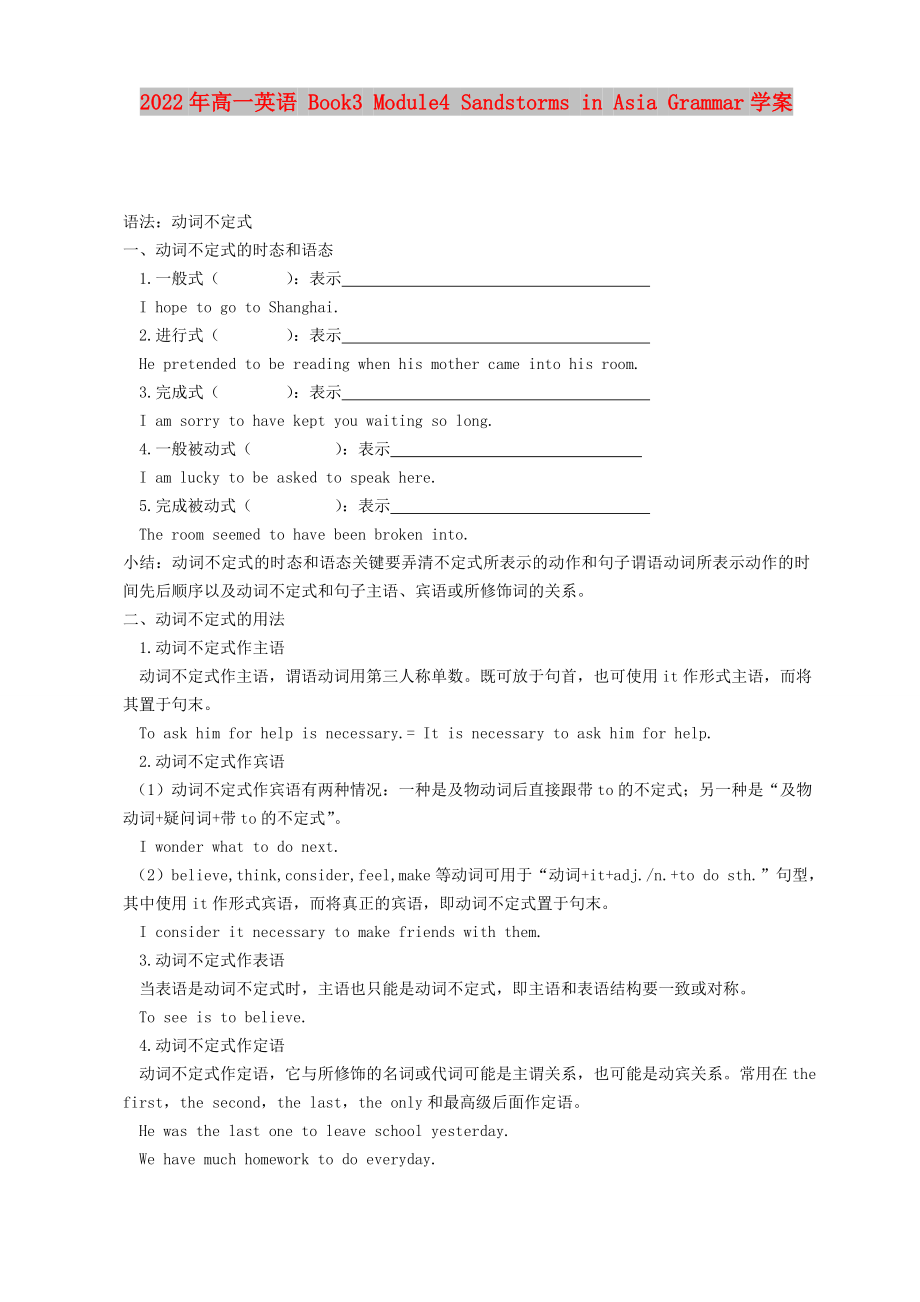《2022年高一英語 Book3 Module4 Sandstorms in Asia Grammar學(xué)案》由會(huì)員分享��,可在線閱讀��,更多相關(guān)《2022年高一英語 Book3 Module4 Sandstorms in Asia Grammar學(xué)案(2頁珍藏版)》請(qǐng)?jiān)谘b配圖網(wǎng)上搜索��。
1��、2022年高一英語 Book3 Module4 Sandstorms in Asia Grammar學(xué)案
語法:動(dòng)詞不定式
一��、 動(dòng)詞不定式的時(shí)態(tài)和語態(tài)
1.一般式( ):表示
I hope to go to Shanghai.
2.進(jìn)行式( ):表示
He pretended to be reading when his mother came into his room.
2��、
3.完成式( ):表示
I am sorry to have kept you waiting so long.
4.一般被動(dòng)式( ):表示
I am lucky to be asked to speak here.
5.完成被動(dòng)式( ):表示
The room seemed to have been brok
3��、en into.
小結(jié):動(dòng)詞不定式的時(shí)態(tài)和語態(tài)關(guān)鍵要弄清不定式所表示的動(dòng)作和句子謂語動(dòng)詞所表示動(dòng)作的時(shí)間先后順序以及動(dòng)詞不定式和句子主語��、賓語或所修飾詞的關(guān)系��。
二、 動(dòng)詞不定式的用法
1.動(dòng)詞不定式作主語
動(dòng)詞不定式作主語��,謂語動(dòng)詞用第三人稱單數(shù)��。既可放于句首��,也可使用it作形式主語��,而將其置于句末��。
To ask him for help is necessary.= It is necessary to ask him for help.
2.動(dòng)詞不定式作賓語
(1)動(dòng)詞不定式作賓語有兩種情況:一種是及物動(dòng)詞后直接跟帶to的不定式��;另一種是“及物動(dòng)詞+疑問
4��、詞+帶to的不定式”��。
I wonder what to do next.
(2)believe,think,consider,feel,make等動(dòng)詞可用于“動(dòng)詞+it+adj./n.+to do sth.”句型��,其中使用it作形式賓語��,而將真正的賓語��,即動(dòng)詞不定式置于句末��。
I consider it necessary to make friends with them.
3.動(dòng)詞不定式作表語
當(dāng)表語是動(dòng)詞不定式時(shí)��,主語也只能是動(dòng)詞不定式��,即主語和表語結(jié)構(gòu)要一致或?qū)ΨQ��。
To see is to believe.
4.動(dòng)詞不定式作定語
動(dòng)詞不
5、定式作定語��,它與所修飾的名詞或代詞可能是主謂關(guān)系��,也可能是動(dòng)賓關(guān)系��。常用在the first��,the second��,the last��,the only和最高級(jí)后面作定語��。
He was the last one to leave school yesterday.
We have much homework to do everyday.
5.動(dòng)詞不定式作賓補(bǔ)
在感官動(dòng)詞feel��,hear��,notice...及使役動(dòng)詞have��,make��,let后的賓語補(bǔ)足語省略to��,變成被動(dòng)語態(tài)時(shí)��,必須要加上to��。
My teacher made me do the experi
6��、ment alone.=I was made the experiment alone.
6.動(dòng)詞不定式作狀語
動(dòng)詞不定式作狀語��,可表示目的��、原因��、結(jié)果等��。
I got up early in order to /so as to catch the first bus.( )
He hurried to the post office, only to find it closed.( )
I am glad to see you here.( )
三��、 but+不定式
(1)在介詞but前有實(shí)意動(dòng)詞do的某種形式時(shí)��,其后不定式一般不帶to��,反之則必須帶to��,表示“不得不��,只能”��。
(2)構(gòu)成固定結(jié)構(gòu)��,如cannot help but(只能),cannot choose but(別無選擇��,只能)��,cannot but(不得不)��,do nothing but��,have nothing to do but(只有��,只能)��。這些結(jié)構(gòu)中��,but后接不帶to的不定式��。
練習(xí):I did nothing but (watch)TV last night.
I had no choice but (wait).
 2022年高一英語 Book3 Module4 Sandstorms in Asia Grammar學(xué)案
2022年高一英語 Book3 Module4 Sandstorms in Asia Grammar學(xué)案

